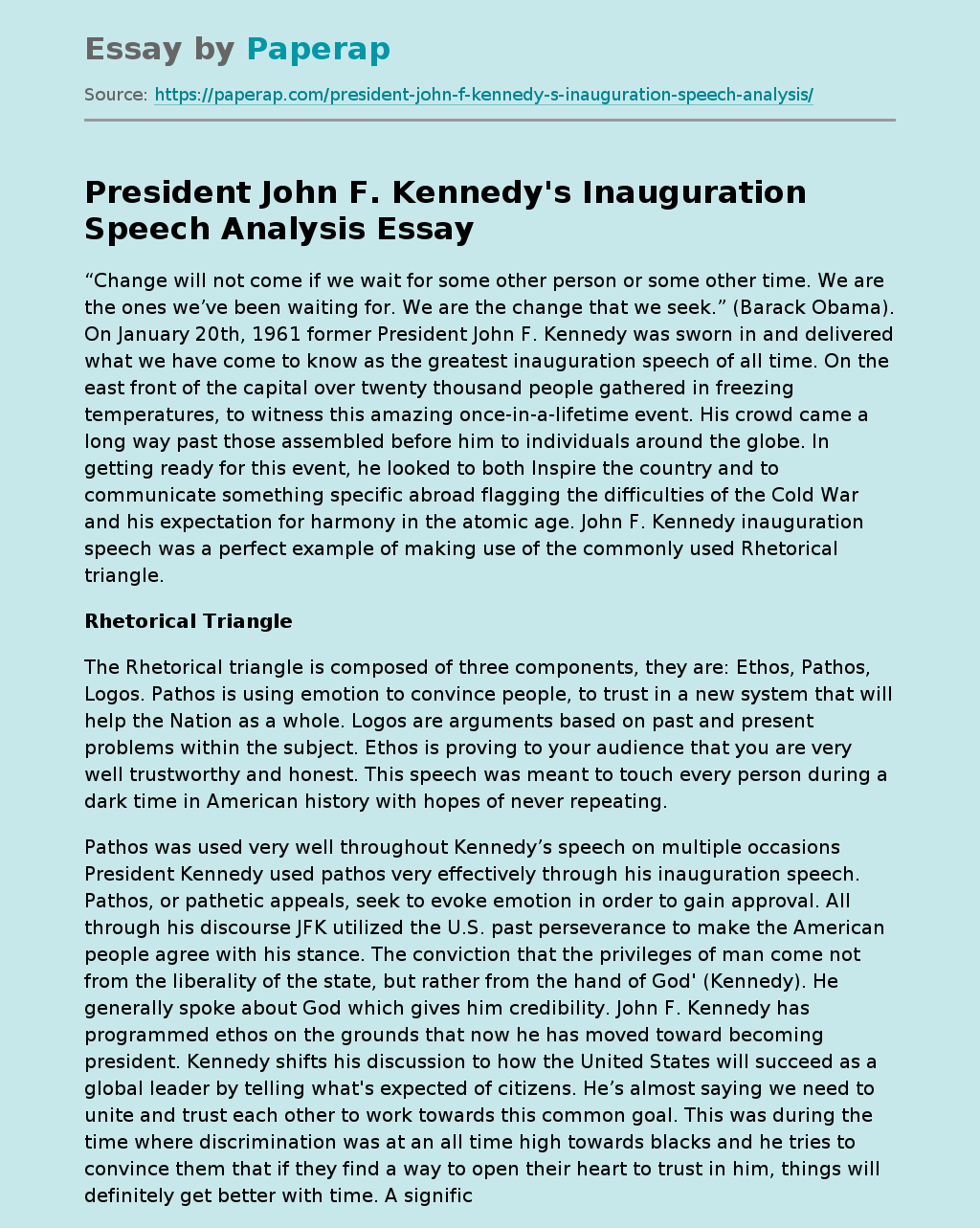President John F. Kennedy's Inauguration Speech Analysis
“Change will not come if we wait for some other person or some other time. We are the ones we’ve been waiting for. We are the change that we seek.” (Barack Obama). On January 20th, 1961 former President John F. Kennedy was sworn in and delivered what we have come to know as the greatest inauguration speech of all time. On the east front of the capital over twenty thousand people gathered in freezing temperatures, to witness this amazing once-in-a-lifetime event.
His crowd came a long way past those assembled before him to individuals around the globe. In getting ready for this event, he looked to both Inspire the country and to communicate something specific abroad flagging the difficulties of the Cold War and his expectation for harmony in the atomic age. John F. Kennedy inauguration speech was a perfect example of making use of the commonly used Rhetorical triangle.
Rhetorical Triangle
The Rhetorical triangle is composed of three components, they are: Ethos, Pathos, Logos.
Pathos is using emotion to convince people, to trust in a new system that will help the Nation as a whole. Logos are arguments based on past and present problems within the subject. Ethos is proving to your audience that you are very well trustworthy and honest. This speech was meant to touch every person during a dark time in American history with hopes of never repeating.
Pathos was used very well throughout Kennedy’s speech on multiple occasions President Kennedy used pathos very effectively through his inauguration speech.
Pathos, or pathetic appeals, seek to evoke emotion in order to gain approval. All through his discourse JFK utilized the U.S. past perseverance to make the American people agree with his stance. The conviction that the privileges of man come not from the liberality of the state, but rather from the hand of God’ (Kennedy). He generally spoke about God which gives him credibility. John F. Kennedy has programmed ethos on the grounds that now he has moved toward becoming president. Kennedy shifts his discussion to how the United States will succeed as a global leader by telling what’s expected of citizens. He’s almost saying we need to unite and trust each other to work towards this common goal. This was during the time where discrimination was at an all time high towards blacks and he tries to convince them that if they find a way to open their heart to trust in him, things will definitely get better with time. A significant part of the emotion he utilizes originates from his dialect; he utilized solid words that passed on a feeling of togetherness and collaboration.
Reagan’s Speech and the Cold War
All through the speech, Kennedy builds up logos through various strategies. He use many analogies, realities, and maxims. Reagan’s speech includes him speaking on the past issues with Russia. He utilizes all certainties of the Cold War (the weapons contest, space race, and whatnot) to make proposition for potential mending with Russia. “Let both sides explore what problems unite us instead of belaboring those problems which divide us” (Kennedy). Kennedy also reasons that our past represents things that we can’t go back and change but we can prepare for the future to avoid this.He mixed expertly logical gadgets, delivering his discourse resound profoundly to any individual who heard it. The group of onlookers of this discussion was proposed to be the world, yet the world around then as well as the world that presently couldn’t seem to come. It was a moment that nobody around the world would forget. I came in contact with this discourse in an American history class, yet even today most Americans have heard most if not the significant part of his address.
Ethos of the Speech
During his inaugural address Kennedy immediately establishes his ethos. Kennedy makes a point to address that he doesn’t need his triumph to be exclusively a triumph for the Democratic Party. Instead of ‘scouring it in the countenances’ of the Republican Party. In a uplifting manner of speaking, Kennedy hopes to set up himself as a president who esteems solidarity over partisanship. Kennedy doesn’t really utilize numerous statics or numbers to manufacture ethos, yet rather utilizes his character and avowing words to construct validity. Having been chosen into office it is a sheltered presumption that he was at that point generally acknowledged as a believable source at this point. He additionally assembles ethos in the manner in which he holds himself and by his way of talking in an unmistakable and firm way.
J.F.K inauguration speech was a key turning point in redirecting the path that America was heading towards. He assured the people that if they trusted him that we can start to improve the nation for all people no matter your color, financial standing or race. This speech is always brought up in the conversation when talking about eye opening moments. On January 20th 1961, JFK gained the trust of the American people and would go down as one of the most well liked presidents. This speech covers all three aspects of the rhetorical triangle: Pathos, Logos, and Ethos.
President John F. Kennedy's Inauguration Speech Analysis. (2021, Nov 11). Retrieved from https://paperap.com/president-john-f-kennedy-s-inauguration-speech-analysis/

